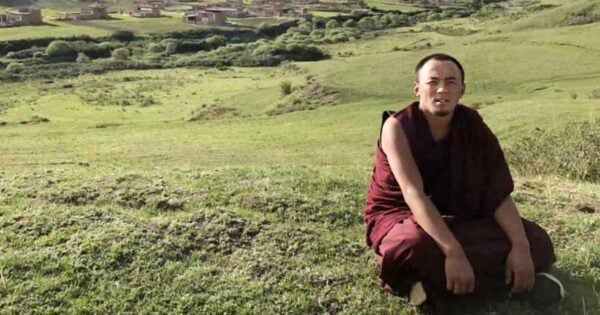The Tibetan monk Rinchen Tsultrim, held in detention incommunicado for exercising his freedom of opinion and thoughts is known to be detained in Mianyang Prison in Sichuan Province. His whereabouts were completely unknown for over a year and a half after Chinese police ‘disappeared’ him on July 27, 2019, for his online messages. After submitting multiple inquiries about his wellbeing and whereabouts, Rinchen’s family were officially notified by Ngaba (Ch: Aba) Public Security Bureau on March 23, 2021. Rinchen’s family were told Rinchen Tsultrim had been sentenced to four years and six months in prison. Although it is now known that he is imprisoned in Mianyang Prison, details of his trial, assuming that there was one, could not be ascertained. Amnesty International last week raised grave concerns for Rinchen Tsultrim’s condition and wellbeing for lack of access to his family and legal representation.

Rinchen Tsultrim
No family member has been able to see Rinchen Tsultrim to date even though Ngaba Public Security Bureau told the family members that two persons from the family could visit him in prison. It is not known why the visit could not take place so far. Rinchen’s father had earlier expressed his will to forfeit his prison visit in exchange for confirmation of the physical integrity of his son in prison.
The secrecy surrounding Rinchen’s imprisonment raises serious concerns about due process applied to the case and a fair trial being denied. While, Rinchen’s family currently do not know the charges Rinchen was convicted on , a Ngaba county state security bureau notice summoning a witness in March 2020 cited that he was suspected of “inciting splittism”. Tibetans with dissenting opinions and thoughts are often tried summarily under “endangering state security” of the Chinese Criminal Law.
In an empirical research of publicly disclosed court rulings and judgments available on China Judgements Online, San Francisco based Dui Hua Foundation found that Kardze (Ch: Ganzi) and Ngaba (Ch: Aba) Tibetan regions are in the top three regions where Endangering State Security court rulings have been publicly disclosed. The International Campaign for Tibet believes the publicly disclosed judgments to be only a fraction of the secretive judgments concerning the political crime of “inciting splittism”. Judges in China exercise discretion in deciding which rulings and judgments to publish, according to Dui Hua Foundation. While the political crime of “inciting splittism” made up 26 out of the 28 publicly disclosed Endangering State Security cases in Kardze, 13 out of 20 cases concerned the political crime of “inciting splittism” in Ngaba. In general, about 60% of those tried for the political crime of “inciting splittism” are in the Tibetan plateau as documented in Dui Hua Foundation’s political prisoner database.
Mianyang Prison is close to the Sichuan provincial capital city of Chengdu. Many Tibetans in eastern Tibet with dissenting opinions and thoughts have been sent to Mianyang Prison to serve their prison term. A Tibetan monk and former political prisoner, Choekyi, died in May 2020 after being released from Mianyang Prison prematurely in January 2019, apparently to shun responsibility for his imminent death in custody due to torture and ill treatment in prison.

